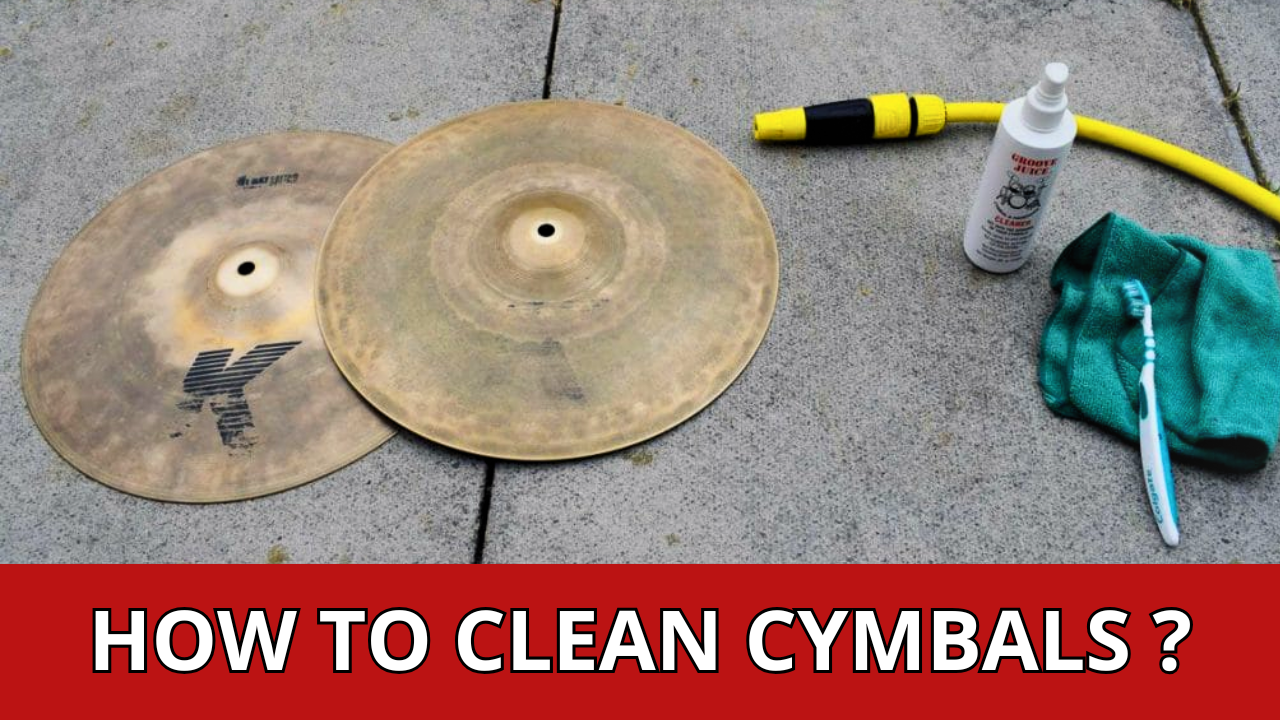Whether you’re practicing indoors or performing in open-airs, caring for your cymbals is something you should not overlook. Cymbals are regularly affected by environmental factors, skin oils, and sweat, and when musicians neglect care routines, cymbals lose their attractive glossy shine over time. That’s why it’s essential to develop a habit of regularly cleaning and caring for your cymbals after each rehearsal or gig to ensure they will maintain their shine and long-lasting service.
Let’s explore key cleaning and maintenance techniques of how you can care for your cymbals.

Ultimate Cymbal Care Guide: Things You Should Consider
Before we dive into cleaning aspects in detail, there are reasons why you need to take the cleaning process seriously:
- Clean cymbals provide good sound quality and serve longer. Dirty cymbals look dull and sound muted.
- Specific finishes and materials of your cymbals need proper care products.
- Improper cleaning tools and techniques can damage cymbals.
- Extended lifespan is impossible without proper storage and transportation of your cymbals.
- Trying to fix any serious problem without professional help may make the situation worse.
Material and Finish
The most commonly used materials for cymbals are bronze and brass. Compared to bronze, made of copper and tin, which stands for high quality, brass cymbals are more affordable, while producing bright sound. Speaking about finishes, you can find several options available on the market:
- Traditional finishes. Cymbals with traditional finishes feature a smooth however less polished appearance compared to brilliant finishes. They sound warmer and offer complex overtones.
- Brilliant finishes. These cymbals stand out due to their polished and glossy appearance. They sound brighter and clearer.
- Raw finishes. Raw cymbals feature a unique, unpolished look and provide a darker sound.
Each material and finish requires its specific needs when it comes to caring. Bronze cymbals are sensitive because of their patina, so they need gentle treatment. Brass cymbals can easily lose their shine, so musicians should regularly polish them. Both brass and bronze are susceptible to fingerprints.

Basic Cleaning Tips
To remove fingerprints from the cymbals’ surface, use a dry, soft cloth. For this purpose, you can buy a microfiber towel. Remove cymbals from your drum set and wipe them down with it after each practice or concert. Use circular motions to clean the entire surface. Avoid using abrasive and harsh materials that can damage their surface. To remove dirt in challenging areas, you can use a soft-bristled brush, however avoid pressing it with excessive force. To avoid fingerprints and oil stains, try to minimize handling your cymbals with bare hands. For this purpose, you can wear gloves when setting up your drum set.
To clean your cymbals of stubborn dirt, you should use cymbal-specific polish, which is typically applied along the grooves. Specially produced polishing products gently contact the metal surface without damaging the finish. Sometimes drummers use mild dish soap or baking soda for cleaning cymbals, however they may not bring the desirable result compared to specialized cleaners.
On the market, you can find cymbal cleaners in liquid that can be used both for cymbals with traditional and brilliant finishes. Typically, they should be sprayed on the surface and then wiped off.
When it comes to non-brilliant finishes, such as buffed bronze, or other natural finish cymbals, it’s not recommended to use cymbal polish cleaners to avoid marks and discoloration. As an alternative, clean them with a soft, dry microfiber towel along the grooves. You can also use mild soap and warm water for them.
How to Clean Cymbals with Water and Soap?
- Use a bin, which is suitable for the biggest of your cymbals, and fill it with warm water.
- Add some soap and submerge one cymbal at a time to avoid scratching and damaging.
- Leave the cymbal to soak for several minutes.
- Use a soft brush (like a toothbrush) to remove the grime. If it doesn’t remove so easily, leave a cymbal in water for longer and try once more.
- Once the dirt is removed, take the cymbal out of the water and dry it with a soft cloth or a paper towel, and set it aside.
- Repeat actions for other cymbals.

How to Clean Cymbals with Cleaners?
- Prepare your cleaning space and remove unnecessary items that can get in the way during the cleaning routine.
- Use a soft cloth to remove dust from cymbals. If you overlook this step, you may come across undesirable scratches after cleaning.
- Read thoroughly the manufacturer instructions and apply cymbal cleaner according to them. Gently run the cleaner onto the cymbal surface with a soft cloth, ensuring the cleaner covers all the surface. Be careful with logos, as they may be damaged with a cleaner.
- To remove excess cleaner, rinse cymbals with water and wipe them off with paper towels to dry.
- You can repeat the same steps to clean cymbals from the other side.
- Before setting your cymbals up in your drum kit, ensure they have dried. When you use a paper towel or a soft cloth, ensure you won’t rub them too much against the cymbals to avoid scratches. Never use a hair dryer to speed up the process as it may damage your cymbals.
How to Use Cymbals to Extend Their Lifespan
Although cymbals are designed to be struck, they still break. To reduce risk of damage and break, ensure that you have all protective plastic or rubber cymbal sleeves and felt washers in place when you install your cymbals on the stand. Otherwise, your cymbals contact metal to metal that can damage the center hole.
Ideally, cymbals should swing freely when the drummer strikes them, so avoid screwing them too tightly. Otherwise, you increase risks of bad resonance and spiderweb cracking at the hole near the bell. For the same reason, you should avoid beating the hell out of them. Try not to hit too hard and in the same area to dampen their sound. Use various drumming techniques.
Also, it’s not recommended to place cymbals too flat, as it increases the stress on the cymbal edges. Angle them slightly toward you and you won’t have any cracks.

How to Store and Transport Cymbals?
How you store your cymbals also plays a significant role for their durability and aesthetic appearance. If you store them in wrong places or low-quality bags, they can bend and suffer from corrosion.
To protect your cymbals from external negative factors and challenges on the road, always wear them in well-padded cymbal bags or use a hard case.
Storing cymbals on their edge can lead to bending and chipping the rims. To avoid those issues, always store and transport them flat.
As cymbals are made from metal, they are too sensitive to humidity. For this reason, avoid storing them in places with high humidity and moisture, especially when you are leaving your cymbals there for an extended period. Prolonged impact of moisture can lead to oxidation and rust. Store cymbals in dry places away from temperature changes.
Conclusion
Over time, when regularly used, cymbals are affected by oils from the drummer’s hands, sweat, and dust that accumulate in the grooves. Dirty cymbals sound muted and look less attractive, which can negatively affect both your performance and your image as a musician. To maintain their shine and extend their lifespan, you should care for cymbals by wiping them off with a soft cloth, cleaning them with special cleaners and polishing products as well as store and use them properly. If you treat your cymbals well, they reward you with high-quality sound that impacts the audience in the way you want them to.
We hope that by using our care and cleaning tips, your cymbals will accompany you on your creative journey for long years.
We’ve already mentioned the importance of proper storage and carrying of your cymbals, however there are more things to consider for drummers who regularly travel and tour. Check out an article about must-have accessories for touring drummers and find out what things you should pack with you for a smooth performance.
Explore more useful products for drummers in our drum and percussion category.



 https://kgumusic.com/pages/about-us
https://kgumusic.com/pages/about-us